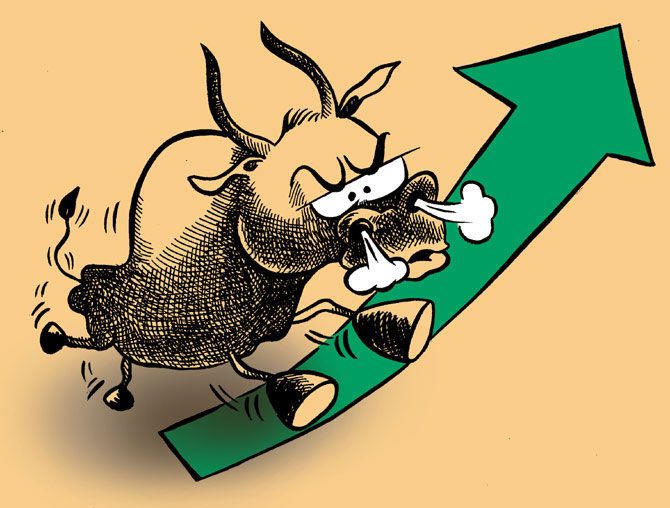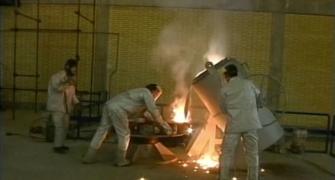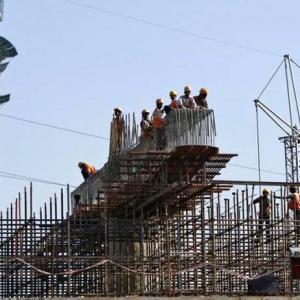In UK, France and Germany, the president and CEO of Edelweiss Securities, anticipates votes in favour of local protection and de-globalisation.
The Indian outlook on the other hand, Vikas Khemani tells Puneet Wadhwa, is robust and largely impervious to overall global trends.
Illustration: Uttam Ghosh/Rediff.com.

Vikas Khemani, president and chief executive officer at Edelweiss Securities says that banking and financial services and insurance (BFSI), industrials, downstream oil and gas plays and information technology (IT) are still reasonably priced and could spearhead the next phase of market rally.
Do snap polls in the United Kingdom add an element of uncertainty for the global financial markets?
Yes. The UK election adds further uncertainty to the Brexit process.
Outcome of these elections across the UK, France and Germany this year is likely to shape the future of European policy.
I anticipate votes incrementally in favour of local protection and de-globalisation, and one has to be prepared to tackle the after effects.
The best strategy is to remain invested in domestic growth stories, as the Indian outlook is robust and largely impervious to overall global trends.
Back home, do you think current market levels are sustainable?
We are definitely slow in earnings upgrade cycle. The economy is improving steadily and emerging out of the cyclical downturn.
Markets have done well post the Union Budget, discounting many of the immediate improvement; strong liquidity has added to it.
Market levels are definitely sustainable over the medium-to-long term.
However, the short term is always difficult to predict.
Are the markets heading towards a bubble zone?
In my view, it would be wrong to paint broader markets with a single bubble zone stroke.
Yes, there are certain pockets where excesses have built up, primarily due to scarcity and liquidity in the market. However, as a broad-based recovery plays out and more stocks come into the market, this will settle down.
But one must bear in mind that with the dip in interest rate, market multiples will be higher than historically when the rates were higher.
What are the key risks to the market rally over the next one year?
I believe the key global risk adjustments taking place due to underlying trends like de-globalisation and protectionism can manifest variously-trade war, currency war or even military conflict. While on one hand global growth prospects have improved, instilling confidence, on the other, these factors add to the risk.
Though these risks are unpredictable, they are present with more than the usual probability.
On the domestic front, any disappointment in monsoon could impact the economic upturn.
How do you see fund flows -- FIIs and MFs -- playing out over the next few quarters?
I believe annual FII inflow of around $10-15 billion is sustainable.
On the domestic front, flow into equities is fuelled by
a) rapid shift in the financialisation of savings;
b) unattractiveness of other available asset classes; and
c) overall increase in the savings pool.
India's annual financial savings are low at mere 8 per cent of GDP (gross domestic product), which are rising gradually.
Within financial savings, given the low interest rate, I envisage the share of equity investments to rise. Even investment of 5 to 10 per cent financial savings in equities implies a $15-20 billion annual domestic inflow, which is not very difficult.
Also read: To live in a post-globalised world
- The end of the world as we know it
- Why the outlook for globalisation is bleak
- Will Trump's 'America First'kick the world into recession?
- Threats India faces in a post-globalised world
Do you think markets are ignoring the likely impact of a deficient monsoon?
The Indian meteorological department has recently forecast a normal monsoon, with chances of deficiency in later part of the season.
I perceive the Modi government's crop insurance as a big initiative to curtail monsoon-induced volatility in the economy. Volatility in incomes and cash flows of farmers impacts the economy meaningfully. If these issues are addressed through productivity improvement, irrigation projects and crop insurance, their impact will be mitigated significantly.
I see that playing out gradually.
What about the goods and services tax (GST) bill implementation?
GST is a structural positive, although its implementation could lead to shift in volumes from one quarter to the next or vice versa.
Apart from minor teething issues, it is a big boon in the long-term. Markets should rather be cheering than getting jittery because of short-term issues.
Which sectors, according to you, will lead the next phase of market rally here on?
According to me, BFSI, industrials, downstream oil and gas plays and IT are still reasonably priced given the growth potential and could spearhead the next phase of market rally.
The first three are domestic cyclicals and should rally as economic recovery picks up pace. IT valuations are attractive and even minor surprises could lead to jump in these stocks.
What is your strategy regarding telecom, metal and oil and gas sectors?
On the telecom front, there is more pain in store. In my view, given the high spectrum capacity, Reliance Jio is the best poised in the space.
With regards to metals, there could be some more upsides given the scope for operating and financial leverage to kick in.
In the oil and gas space, we like the downstream segment and city gas distribution companies.
How should one play the infrastructure and real estate themes ahead of the Real Estate (Regulation and Development) Act?
Infrastructure is best played through asset creators and given the governments' strong push one should own EPC companies in the space.
Also, recent products like INVIET can be a good way to play long dated, yield generating infra assets.
With regards to Real Estate, it could undergo a transition phase owing to implementation of RERA. Here the weak could get weaker and the strong stronger.










